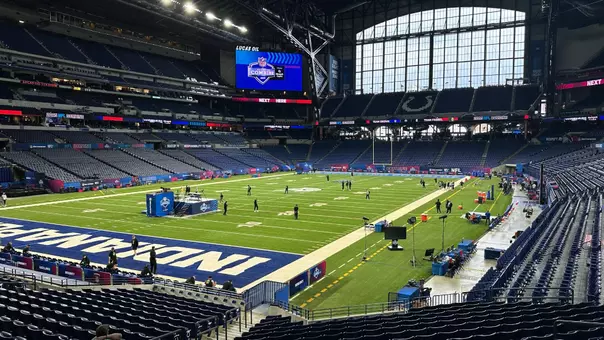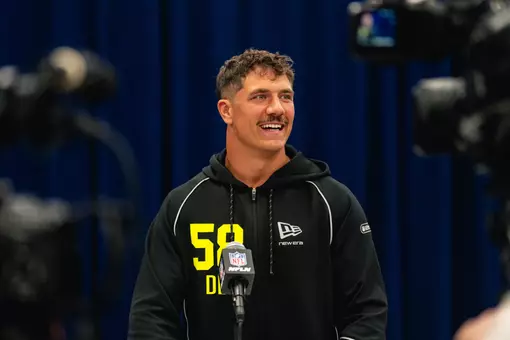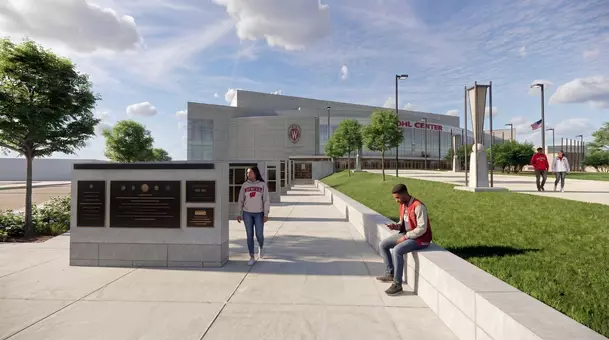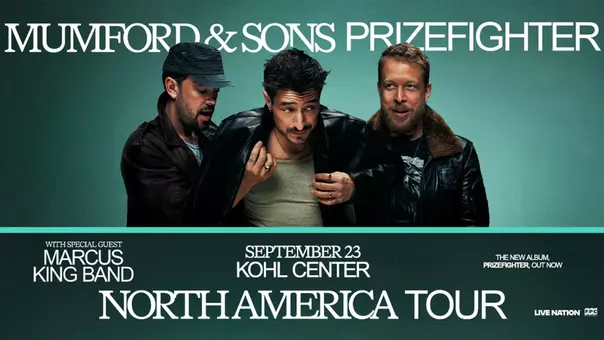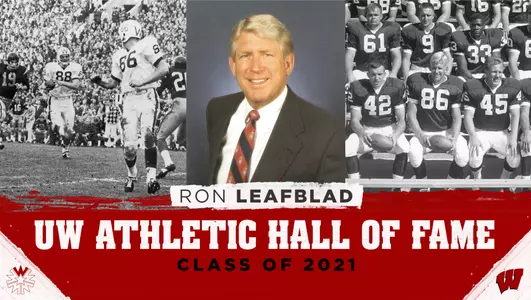
2021 UW Athletic Hall of Fame: Ron Leafblad
June 09, 2021 | Football, General News, Mike Lucas
Tight end of 1963 Rose Bowl Badgers excelled in business and giving back
 |
|
|
BY MIKE LUCAS
UWBadgers.com Senior Writer
Leafblad, a lanky prep running back, by his own description, had just left home in Waukegan, Illinois with two travel bags, a bus ticket, $20 bucks in his pocket and one thing in his mind.
"I was going to do whatever I had to do to survive," he said, "and make it happen."
As an incoming college freshman, he had his parent's blessings and the drive to make them proud by playing Big Ten football and getting his degree. And he did so on both counts.
So much so that the next chapter in his Badger story is Leafblad's selection to the University of Wisconsin Athletic Hall of Fame, Class of 2021, based on his special service to the school and program.
But let's not get ahead of the narrative. Dial it all the way back to 1960.
Upon arriving at the Madison Greyhound bus station, Leafblad was unwilling to spend any money on a cab, so he walked to his Elm Drive dorm on the far end of campus. It was a fairly good hike.
But he was wired for it. At an early age, Harold Leafblad shaped his son's work ethic and always encouraged him to go that extra mile. And, obviously, this was the literal application.
At that, Ron Leafblad approached everything the same way which is why he was a reliable two-way player, including a sure-handed tight end on the '63 Rose Bowl team and a senior co-captain.
It's also why Leafblad has been such a shrewd and successful businessman whose charitable generosity has been a lifeline for various athletic department projects at his alma mater.
"He has been very involved and very generous towards us," said UW athletic director Barry Alvarez. "You have to have people who are willing to give back and help support your program.
"You hear Ron talk about how grateful he was for his experience and education here as a student-athlete and the programs extended to him that allowed him to move into his businesses."
In 2012, Leafblad presented the UW with a $1 million gift as part of the Stephen M. Bennett Student-Athlete Performance Center renovations on the ground floor of the McClain Center.
An 11,000-square foot locker room, accommodating 122 student-athletes; a coaches' locker room; an equipment room; and player's lounge were features of the Ron Leafblad Family Football Team Suite.
Dating back nearly four decades to his founding of Gold Country, Inc., he has aligned himself on both sides of the Border Battle through retail sales properties like Goldy's and Bucky's Locker Rooms.
"I'm 78-years-old but I'm still very much involved in all of my companies," boosted Leafblad, whose holdings include Signature Concepts, a custom apparel and branded merchandise provider.
Some people collect stamps. Other collect trading cards. Leafblad collects companies and grows them. A pursuit that has never gotten old: "I still love getting up in the morning and going to work."
A deft multi-tasker, he has been the overseer of as many as seven companies at once ranging from the manufacturing of precision metal components for computers to outpatient physical therapy.
Asked about his efficient but non-threatening management style, Leafblad, an English major, explained, "I've got general managers and presidents for each company and I kind of orchestrate it."
Given his evolution in the business model — at 29, he was a division president — he connected the dots in his worlds, "An athlete has to learn to pay the price. You expect a lot out of yourself.
"You know you can't loaf or glide through and still perform on Saturdays. As I worked hard and performed on the business side, people said, 'Let's move Ron along.'
"They found out that I could make money for them. I got into general management very early because some people, who are my mentors in business, really believed in me."
The Leafblad brand has steadily grown stronger; one success leveraging the next.
"When people look at the quality reputation we have," he said, "I can't tell you how many times we've taken on jobs where we didn't have a clue when we started but we found a way to get it done.
"If they need something on Friday, we'll get it to them on a Thursday — a can-do attitude that's kind of fundamental. If you work a few more hours than the next guy, you'll probably outperform him."
Such resolve was inherited from his dad, a steelworker by day and a landscaper afterhours.
"Whistled all the time," Leafblad said. "Happiest, hardest working guy you've ever seen."
Nobody may have been happier than Harold Leafblad when Wisconsin head coach Milt Bruhn invited father and son into his Camp Randall Stadium office for a recruiting visit and pep talk.
"Milt picked up on the fact my grandparents came over from Sweden and settled in Bayfield County, way up north by the Apostle Islands, the furthest point north in the state," he said.
"Milt said to my dad, 'Because your family came from Sweden and settled in northern Wisconsin, I just think it's appropriate your son comes to the University of Wisconsin?
"What do you think, Harold?
"I think you're right."
Leafblad laughed, "That's how difficult my decision was. My father helped make it for me."
It was a decision that he never regretted. On the field. Or in the boardroom.
• • • •
It was not all smooth sailing in football. There were some physical complications. In the fall of 1961, Leafblad spent three weeks at Mayo Clinic in Rochester, Minn., because he was having so much trouble with his back. He was advised that it was likely a chronic condition from a childhood injury.
During his senior year at Waukegan High School, he had played through the pain. "Played every game but it just got worse and worse," he remembered. "I worked for my father during the summer which didn't help, either, laying sod. And then, I aggravated it the spring of my freshman year."
Leafblad was able to avoid surgery on his back. The Big Ten also granted him another year of eligibility due to the injury. Outside of some morning soreness, it was not an issue again. "But most of my other body parts have been replaced," he chuckled. "Shoulders, knees, aortic valve."
As a sophomore, Leafblad broke into the lineup as a blocking tight end, a nice complement to UW's marquee playmaker, Pat Richter, a close friend to this day. In 1962, Richter had 49 catches for 694 yards and six touchdowns. Leafblad had three receptions for 43 yards and one score.
It was the only time that Leafblad got into the end zone during his career. But it was huge. It came on a 13-yard pass from quarterback Ron VanderKelen in the second quarter of the Minnesota game and with the successful conversion, it pushed Wisconsin into a 7-6 halftime lead.
Entering the regular season finale at Camp Randall Stadium, the Badgers were virtually assured of getting the official bid to the Rose Bowl — regardless of the outcome — when the Big Ten athletic directors were polled. The Gophers were ineligible after back-to-back trips to Pasadena.
Still, it was Minnesota-Wisconsin, Goldy vs. Bucky, the annual renewal of the rivalry. Both teams were 5-1 in the conference. And what ensued in Camp Randall was the most controversial finish in the history of the series when an apparent VanderKelen interception was erased by a roughing penalty.
Minnesota's All-American linebacker Bobby Bell was guilty of the infraction which was the springboard for an 80-yard scoring drive culminating with fullback Ralph Kurek's two-yard touchdown run giving the Badgers a come-from-behind 14-9 win. Jim Nettles' pick sealed the deal.
Besides Bell's 15-yard roughing the passer call, Minnesota coach Murray Warmath was also assessed a 15-yard penalty for going ballistic and grabbing the field judge. A group of Gopher fans took up Warmath's argument after the game by confronting the officials as they ran off the field.
The following day, The Wisconsin State Journal reported in its Sunday edition, "Police hurried to provide safe conduct (for the referee) but in the following melee a fan did break through the police ring and jump on the back of one of the officials."
Good call? Or bad call? The late Sid Hartman, the longtime Minneapolis Star Tribune columnist, thought it was such an egregious misjustice that he left the Camp Randall press box, ran on to the field and got in the face of an official. Was it a late hit on VanderKelen? Was it roughing on Bell?
"We looked at it four or five times and we thought for sure it was pretty blatant," said Leafblad, sticking to his story all these years later. "Whenever I'm with some of my Gopher friends, they're still griping about that and complaining mainly because of that penalty on Bobby Bell."
Oregon State's Terry Baker won the 1962 Heisman Trophy. Bell was third in the voting, Richter was sixth and VanderKelen was ninth. Bell, Richter and VanderKelen went on to play in the NFL. Leafblad went on to be a Badger co-captain with Ron Frain as a senior in 1964.
While on campus for the 2005 Homecoming game, celebrating the Camp Randall renovation and another generous $1 million gift to his alma mater, Leafblad said, "I was not a loud, emotional, hollering type of leader. But I always worked hard. Maybe that's what gained my respect on the team."
That respect for Leafblad has carried over to all facets of his life — revolving around his largesse and business acumen — paving the way to the UW Athletics Hall of Fame. Happiest, hardest working guy you've ever seen. Which is not surprising considering his lineage.

